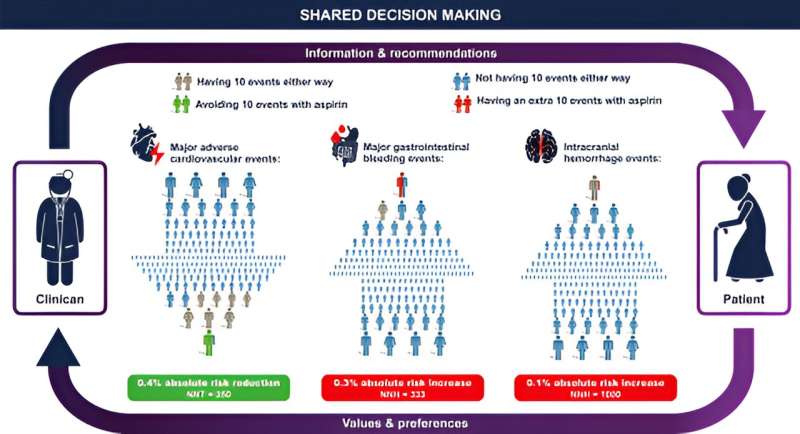This article has been reviewed according to Science X's editorial process and policies. Editors have highlighted the following attributes while ensuring the content's credibility:
fact-checked
peer-reviewed publication
trusted source
proofread
New guidelines: If you've never had a heart attack, don't take daily aspirin until you talk to your doctor

Should you be taking daily aspirin to prevent a first heart attack or stroke? New Canadian guidelines released over the weekend suggest it's not for everyone.
The research is published in the Canadian Journal of Cardiology.
"Historically, the answer was yes, but now routine use for primary prevention is not recommended," says lead author Kevin Bainey, associate professor of medicine in the University of Alberta's Faculty of Medicine & Dentistry, interventional cardiologist at the Mazankowski Alberta Heart Institute and researcher with the Canadian VIGOUR Centre.
"The evidence shows the bleeding risk balances the benefits in those who have never had a heart attack," he says. "However, if you have had a heart attack it is very clear it makes sense to take antiplatelet agents, including aspirin."
The new guidelines cover whether and when Canadian patients should take aspirin and other antiplatelet therapies for the primary or secondary prevention of atherosclerotic cardiovascular disease. Antiplatelet medications prevent the formation of blood clots. Also known as ischemic heart disease or coronary artery disease, the buildup of plaque in the heart's arteries can lead to heart attack, stroke or death. It's the second leading cause of death in Canada, according to Health Canada.
Conventional wisdom since the 1980s has suggested that taking low-dose aspirin daily was a harmless way for people over 50 to prevent heart attack, but more recent research has revealed that daily aspirin used routinely increases the risk of major bleeding, negating the benefits.
Talk to your doctor
Daily aspirin could be used for people with high risk factors for heart attack—a family history of premature coronary artery disease, diabetes, high cholesterol, high blood pressure and smoking, Bainey notes.
"A 10 percent risk reduction is reported consistently in the academic literature," he says, "but we also need to recognize that bleeding can be harmful."
The key is to talk to your doctor to decide what's best for you. The guidelines include a new decision aid tool to guide those conversations based on evidence.
"We really focus on individual patients and determining their cardiovascular risk, their risk of bleeding, and then tailoring antiplatelet therapy to maximize the outcomes for those patients," says Bainey. "So it's really taking it to a different level; we're the first in the world to endorse a shared decision-making model between the doctor and the patient for using aspirin as primary prevention."
Bainey had this very conversation with his own father, who has not had a heart attack but has diabetes, high cholesterol, high blood pressure and a low risk of bleeding. His dad is now taking antiplatelet therapy to address those risk factors.
Reducing risk, improving survival
The new guidelines give Canadian patients and their doctors access to the latest scientific findings, which have changed considerably since the last time the guidelines were updated in 2018. While the daily aspirin question for primary prevention is likely the most controversial topic tackled by the new guidelines, most of the guidelines focus on secondary prevention, for people who have already developed atherosclerotic cardiovascular disease and want to avoid further damage to their hearts.
"Secondary prevention means that okay, you have cardiovascular disease, you've had a heart attack or open heart surgery or stents, and now we want to reduce the risk of having another heart attack and improve survival," says Bainey, who has led a number of research projects on the use of powerful antiplatelet agents called P2Y12 inhibitors, which are often used in combination with aspirin as secondary prevention measures.
Patients who have had a heart attack, stroke, stents or open heart surgery may be on some of these therapies for as little as a month or as long as three years. The new guidelines give clear recommendations for escalating or de-escalating the therapies through the course of a patient's treatment based on an objective assessment of each patient's ischemic and bleeding risk.
"It's important for us to provide clinicians with the most up-to-date contemporary evidence to improve patient care and patient outcomes," says Bainey. "Many of these therapies lead towards improvement in survival in our cardiovascular patients."
The new guidelines were released at a joint meeting of the Canadian Cardiovascular Society and the Canadian Association of Interventional Cardiology.
More information: Kevin R. Bainey et al, 2023 Canadian Cardiovascular Society/Canadian Association of Interventional Cardiology Focused Update of the Guidelines for the Use of Antiplatelet Therapy, Canadian Journal of Cardiology (2023). DOI: 10.1016/j.cjca.2023.10.013



















